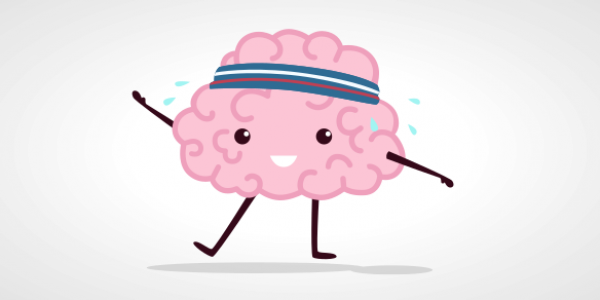Laughter: Good for Your Brain

Stop me if you heard this one: humor and laughing is really good for you. That's not a joke. It's science!
According to science (Wiseman, 2002), this is the World’s Funniest Joke:
Two hunters are out in the woods when one of them collapses. He doesn't seem to be breathing and his eyes are glazed. The other guy whips out his phone and calls the emergency services. He gasps, "My friend is dead! What can I do?"
The operator says, "Calm down. I can help. First, let's make sure he's dead."
There is a silence; then a gunshot is heard.
Back on the phone, the guy says, "OK, now what?"
Personally, I love that joke. It was written by British comedian Spike Mulligan in 1952 for a TV show called Goon Show, and it’s the kind of joke that makes me giggle every time I hear it.
But, maybe that joke wasn’t your bag. Maybe you’d prefer some classic dad jokes:
- What do you call a fake noodle? An Impasta.
- How many apples grow on a tree? All of them.
- Two goldfish are in a tank. The first one says to the other, “Hey, do you know how to drive this thing?”
- Kid: Dad, did you get a haircut?
Dad: Nope, I got them all cut!
(Confession: I say this one every single time I come home from the barber. Every. Single. Time.)
Or, how about some one-liners from the brilliant absurdist comedian, Steven Wright:
- I went to a place to eat; it said 'breakfast at any time,' so I ordered French Toast during the Renaissance.
- I broke a mirror in my house and I’m supposed to get seven years bad luck, but my lawyer thinks he can get me five.
- I spilled spot remover on my dog… now he's gone.
Or, maybe you find political humor funny. Or dirty jokes. Or slapstick. Maybe you’re someone who loves to watch improvisational comedy. Perhaps you really appreciate more cerebral humor done with a wry wit by a brilliant satirist. Or, maybe you just love a good old fashioned fart gag.
But, no matter what you find funny, one thing is certain: Humans laugh. We seem to be wired for humor. Humor is as fundamental to all human populations across the planet as sex. Everyone does it, everywhere. In fact, the phonetic forms of laughter (how laughter is pronounced in writing and in description, ie. “ha ha” or “hee hee”) is remarkably similar across all cultures and languages. So, that means that no matter where you are in the world, or where you are in time, laughter will always sound the same.
Interestingly, there is much debate as to why humor exists. Philosophers, psychologists, scientists, and scholars have argued about why humans think some things are funny, or why we even started laughing at all. There is some thought that our primate ancestors started laughing to signal that a perceived threat wasn’t as dangerous as it seemed, or perhaps to teach their young how to play and get along with each other. But, to this day, no one has come up with a clear and definitive scientific explanation for what is funny.
Cristen Conger at How Stuff Works has a great article called “Is there a Scientific Formula for Funny,” where she examines much of the history of this debate, starting with the ancient Greeks and ending with recent neurological and psychological research that’s been done over the past 20 years. It’s a great read, and I strongly encourage our readers to pop over there and check it out.
But, as Chris Rock said, “You know what’s not funny? Thinking about it.” So, rather than spending more time trying to understand something that we all just do, let’s focus on why laughter and humor matter to us in the first place.
The Benefits of Laughter and Comedy
At the risk of sounding too cliche here, science has shown that laughter really is pretty good medicine. Here’s what we know about the psychological, physiological, and emotional benefits of laughter:
- Laughter is a potent releaser of endorphins. A very recent article published in the Journal of Neuroscience (Manninen et al, 2017) shows that laughing with others releases endorphins (the chemicals that help us to feel good) in our brain via opioid receptors. The more opioid receptors in the brain, the more powerful the effect. And, yes, these are the same receptors that highly addictive opioid drugs also bind to, suggesting that laughter induces euphoria in much the same way that a narcotic might.
- Laughter contagiously forms social bonds. The endorphin effect from the study noted above also describes why laughter seems to be so contagious. Spreading endorphin release through groups promotes feelings of togetherness and safety. Laughter of one member of the group can trigger endorphin release in other members of the group, leading to a chain reaction of laughter among group members.
- Laughter has an effect similar to antidepressants. Laughter has been shown to activate the release of serotonin, the neurotransmitter affected by the most common types of antidepressants (Cha and Hong, 2013). The effect may not last as long as antidepressants, but the research demonstrates that laughter triggers at least a potent short-term dump of the chemical into our brains.
- Laughter improves your mental health. Research has found that laughter releases physical and emotional tension, elevates mood, enhances cognitive functioning, and increases friendliness (Mora-Ripoll, 2010).
- Laughter protects your heart! How about that? A 2000 study found that laughter seems to have an anti-inflammatory effect that protects blood vessels and heart muscles from the effects of cardiovascular disease.
So, get out there and laugh more! Spend time with people who make you laugh. Tell jokes. Listen to other people’s jokes. Go find some great stand-up comedy near you. Find some comedy podcasts and share them with friends. Practice gratitude. Try laughter yoga (it’s a real thing, and it’s kind of great).
Or just go read the funniest joke in the world again.
Seriously, it’s pretty good.
Related Articles

Exercise Your Body, Exercise Your Brain
For years, we’ve had an inkling that exercise may be good for the brain. But now, researchers are beginning to understand how this could be!


What Happens When We Eliminate Boredom?
Right there in your pocket, you have a device that can entertain your brain any time you want, and you'll never have to feel bored again. But, is there a cost to never being bored?





